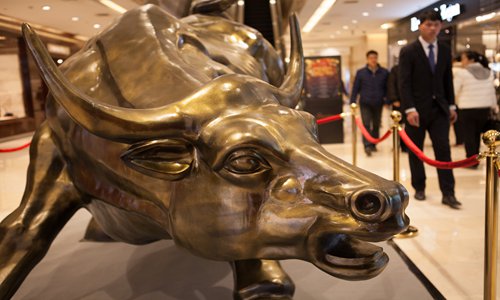HOME >> BUSINESS
Airbnb’s asset-light business model benefits where WeWork’s spending strategy lacks
Source:Global Times Published: 2019/9/23 19:48:39

A bull sculpture that looks very much like the one on Wall Street is seen in a shopping mall in Beijing near the offices of the China Securities Regulatory Commission on Wednesday. The sculpture attracts many people passing by, and Chinese investors joke that "this is the place" for the sculpture. Photo: CFP
If there's a company WeWork wishes it were, it could be Airbnb. The office-sharing firm's initial public offering has been postponed because investors took a look at the underlying business, as well as the company's governance, and decided they wanted none of it at anything like the company's $47 billion private-market valuation - or indeed at half that, or less. Although Airbnb is another overgrown upstart in the space-sharing business, its IPO, targeted for 2020 according to the company on Thursday, may succeed in many of the ways WeWork's is failing.Airbnb, which connects travelers with vacation homes and rooms for rent, was valued at over $30 billion in a private fundraising back in 2017, according to media reports. And as a prelude to confirming its listing plans, it said this week that second-quarter revenue was well over $1 billion. The company said previously it had positive EBITDA in 2017 and 2018.
That statistic is Exhibit A for why the public offering of the company run by Brian Chesky could go far better than WeWork's.
The latter, led by Adam Neumann, has a voracious appetite for cash to spend on leases, fixing up offices, and attracting customers. It lost over $500 million at the EBITDA level last quarter on revenue smaller than Airbnb's.
Investors have taken fright at the absence of a trajectory toward profitability, partly because WeWork lacks significant economies of scale and faces lots of potential competition. There's also a surfeit of red flags surrounding governance.
Airbnb simply has a better business model with real benefits of scale. It is genuinely asset light, collecting fees as owners rent out and maintain their own real estate.
There are a few online competitors such as Expedia's VRBO, and hotel chains such as Marriott International are trying to muscle in. But like, say, Facebook, Airbnb benefits from network effects: Travelers want to go where homes are listed, and vice versa.
All this adds up to growth with minimal need for capital. The company has only raised $4.4 billion in total, according to Crunchbase.
WeWork has raised over three times as much from backers including SoftBank. That means Airbnb can afford to wait for its IPO - and that's a much more appealing pitch than WeWork's overvalued desperation.
The author is Robert Cyran, a Reuters Breakingviews columnist. The article was first published on Reuters Breakingviews. bizopinion@globaltimes.com.cn
Posted in: INSIDER'S EYE